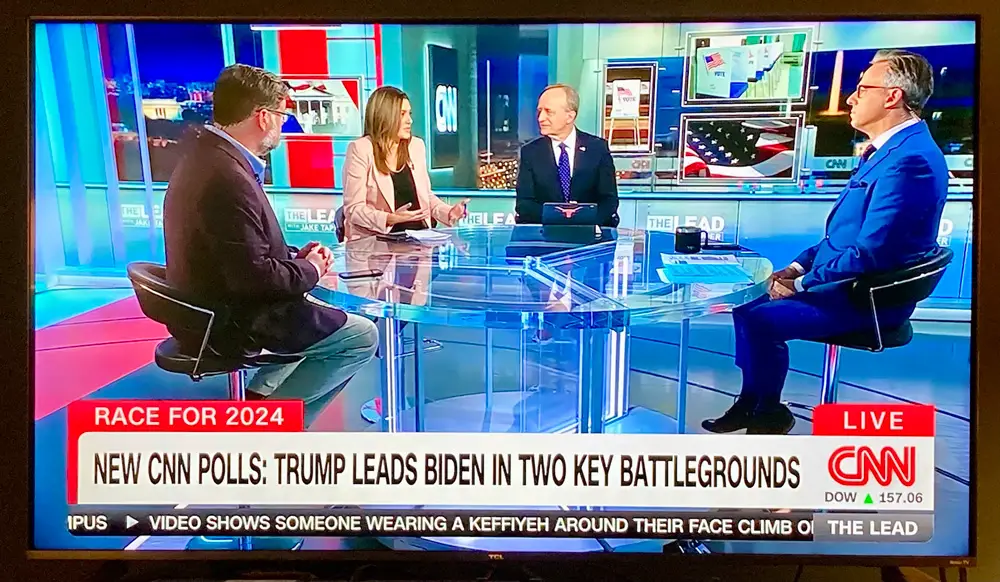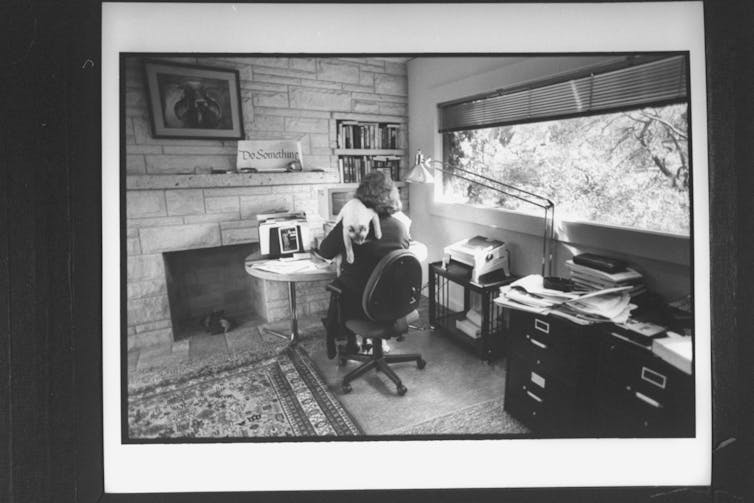
By Mike McDevitt
Walter Lippmann, who lived from 1889 to 1974, was an early and prime example of the public intellectual as pundit commenting on news of the day.
Lippmann, a Pulitzer Prize winner, wrote a syndicated column on national and international affairs. He advocated a philosophy in which honest reflection on common experiences would lift citizens out of their parochial worldviews.
A pundit is someone who offers commentary in the media on a particular subject area. A gallery of legacy newspaper pundits would include a more raucous wing. Turn a corner and the cranky “Sage of Baltimore,” H. L. Mencken, appears. The satirist and cultural critic, who was born in 1880 and died in 1956, lived for most of his life in a neighborhood of old West Baltimore.
He was suspicious of representative democracy and predicted in 1920: “On some great and glorious day, the plain folks of the land will reach their heart’s desire at last, and the White House will be adorned by a downright moron.”
The syndicated humorist Mike Royko would bring a more working-class sensibility to his targets. He began writing columns for a U.S. Air Force newspaper in 1955 and would eventually produce more than 7,500 daily columns for Chicago newspapers. Among his targets was Frank Sinatra, whom the columnist once accused of commandeering Chicago police for personal security.
Molly Ivins appears next, promising in 2003 “even more bushwhacking.” She co-wrote “Bushwhacked: Life in George W. Bush’s America” in conjunction with newspaper columns that were frequently critical of the president, a fellow Texan.
Holding politicians and institutions accountable often requires combative voices. What kind of commentary is needed now, though, when so much political talk is degrading and divisive? I ask this question as a former editorial writer who studies how journalism operates as a political institution. I want to suggest that pundits support democracy when their combat is driven by ideas rather than tribal identities.

Mark Perlstein/Getty Images
Pundit proliferation
Punditry became a more central feature of democracy with the expansion of mass media in the 20th century. While Lippmann emphasized the civic value of commentary, punditry would prove its commercial value, too.
Mass media in the 1950s featured radio hosts who delighted in browbeating callers. Those hosts were rewarded with increased ratings. Radio and television punditry also helped stations to fill air time with relatively modest production costs.
The New York Times is not representative of mainstream newspapers, but its expansion of opinion journalism over the last few decades is illustrative. The paper published just two columnists in the early 1950s. By 1994, the Times featured eight. A similar expansion occurred at The Washington Post and many regional newspapers across the country.
The rise of a television pundit class in the 1960s established a new type of celebrity, thanks largely to William F. Buckley’s “Firing Line,” which ran from 1966 to 1999. Leaning back in a chair, clipboard in hand, eyes darting, the conservative author typically treated guests politely on the public affairs show.
Lippmann’s vision of the pundit as public intellectual sought to preserve “the traditions of civility” during the advent of broadcast media. The aspiration was hardly a source of inspiration for “The McLaughlin Group” and other shout shows launched in the 1980s. Shout shows are televised, short-form debates. Conversations quickly turn into confrontations.
Incentives to punch up
Columnists cannot replicate the visceral experience of the shout shows, although the ability of readers to graze online heightens the incentive to punch up punditry. Deadlines, of course, are another barrier to high-minded commentary. Lippmann explained that a column is produced by a “puzzled man” who draws “sketches in the sand, which the sea will wash away.”
Punditry today carries a negative connotation, as it conjures “talking heads” spewing opinions. Turn on CNN or Fox News any time of day to see examples. The term “pundit,” though, is derived from the Sanskrit word “pandrita,” meaning “learned.”
Many pundits are not trained in journalism. Instead, they bring expertise from many other realms. However, when they appear in a journalistic setting, they can be evaluated based on the principles that responsible journalists adhere to: verification, independence and accountability.
The same historical forces that add to the diversity of candidates during election cycles have put pressure on cable channels to diversify the pundits they feature. Punditry has become democratized but also institutionalized. University communications staff offers experts on just about any topic. Think tanks with ideological agendas make their own experts available to provide analyses that appear considered and neutral.
Cable news, online news and the legacy press offer punditry to distracted and increasingly fragmented audiences. As a scholar of political communication, I believe punditry is likely to become more specialized in catering to particular interests. This trend works against Lippmann’s principle of commentary that offers reflection on common experiences.
Pundits and democracy
Trust in politics is preserved when citizens perceive that leaders, institutions and fellow citizens abide by the rules of the game. Commentary that oversimplifies policy disagreement erodes the trust that citizens have for each other, especially when opponents are belittled.
Lippmann was prescient about what scholars today describe as “democratic backsliding,” a process marked by the failure of government to solve problems accompanied by decline in the quality of political discourse.
Pundits contribute to democratic backsliding when they cultivate dystopian views of politics. The best example is the relentless negativity that characterized commentary on presidential candidates Hillary Clinton and Donald Trump in 2016. As media scholar Thomas Patterson wrote, “When everything and everybody is portrayed as deeply flawed, there’s no sense making distinctions on that score, which works to the advantage of those who are more deeply flawed.”
In an influential 2005 study, Diana Mutz and Byron Reeves asked: “Is watching politicians and pundits hurl insults at one another on television merely a harmless pastime, or does it have consequences for how people think about politics and government?”
The authors staged experiments in which professional actors played congressional candidates sitting together in a television studio. Participants in the study watched different versions of the mock talk show. Candidates expressed the same issue positions, using the same words, and in the civil version were always polite. In the uncivil version, raised voices, rolling of the eyes and gratuitous asides demonstrated candidates’ lack of respect for each other.
The authors reported that “political differences of opinion do not, in and of themselves, harm attitudes toward politics and politicians. However, political trust is adversely affected by levels of incivility in these exchanges.” Participants exposed to the uncivil exchanges scored lower for trust in politicians, Congress and the political system.
Supporting democracy
What are the alternatives, then, to the polarizing pundit? Many political theorists insist that there is democratic value in heated commentary that calls out injustice.
Media scholar Patricia Rossini suggests that in evaluating political expression, people should be concerned not so much about tone as tolerance.
Audiences should also keep in mind the incentives of pundits, especially when commentators use their platforms to nurture relationships with politicians who undermine democracy.
Joe Scarborough, co-host of MSNBC’s “Morning Joe,” regularly featured the celebrity candidate Trump in 2015. The Washington Post took notice of the “many times Donald Trump and ‘Morning Joe’ yukked it up”. Scarborough would later feud with Trump, but at the time, Trump was useful in attracting viewers.
Pundits can play a productive role by focusing on issues rather than identities.
Americans are divided not so much by policies as mega-identities that combine the political with race and religion. Recent scholarship has demonstrated that issue polarization is less of a problem as long as opponents see humanity in the other side.
![]()
Mike McDevitt is Professor of journalism and media studies at the University of Colorado Boulder.





























Pogo says
@Mike McDevitt
Thank you for your interesting anecdotes and observations.
Related
Where Ideas Go to Die: The Fate of Intellect in American Journalism
https://www.google.com/search?q=Where+Ideas+Go+to+Die%3A+The+Fate+of+Intellect+in+American+Journalism
As stated
https://www.colorado.edu/cmci/people/journalism/michael-mcdevitt
Ray W. says
Thank youu, Pogo.
The exercise intellectual rigor requires that one be willing to abandon a good understanding of the workings of the world whenever a better understanding is learned or discovered.
For example, with the violence in the Mideast, along with the many valid and serious concerns for it spreading beyond the confines of Palestine, the status of the international crude oil marketplace has become somewhat fragile. Iran has seized an oil tanker filled with Iraqi oil, after we seized it last year from Iran. The Houthi rebels are shooting missiles and launching rockets at merchant ships, regardless of the nationality of the owner. Companies are redirecting cargo ships around the South African cape, slowing delivery times and increasing shipping costs. Insurance companies are raising rates.
One side effect of the instability is that Asian nations are turning to U.S. crude oil distributors for their energy needs. Given the recent rise to record levels of American crude oil production, American exports of crude oil have increased recently, as it is now cheaper to buy from American sources, even if it costs more to transport it from America across the Pacific to Asian markets. In response, Saudi Arabia announced a discount on its price for crude oil, but only for its long-term Asian business partners. No, Saudi Arabia has not adjusted its self-imposed reduction in production volume. Retaining market share in an international marketplace, it seems, is important to the Saudi government.
Pogo says
@Ray W.
Interesting times, as the Chinese “blessing” has it. Envy of the dead seems to be more and more probable with every passing day.
Anyway, sincerely, thanks — and happy new year. Be well.
William Moya says
👍